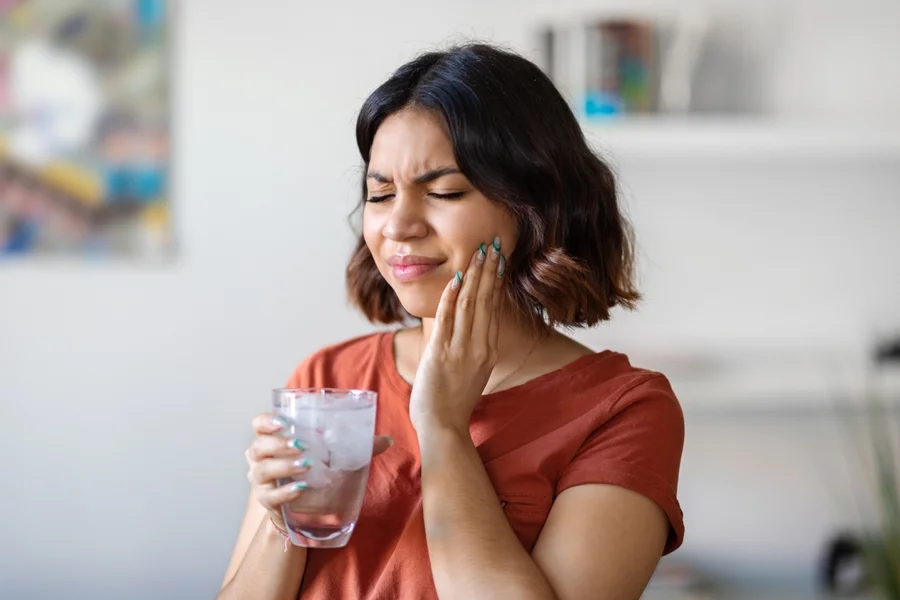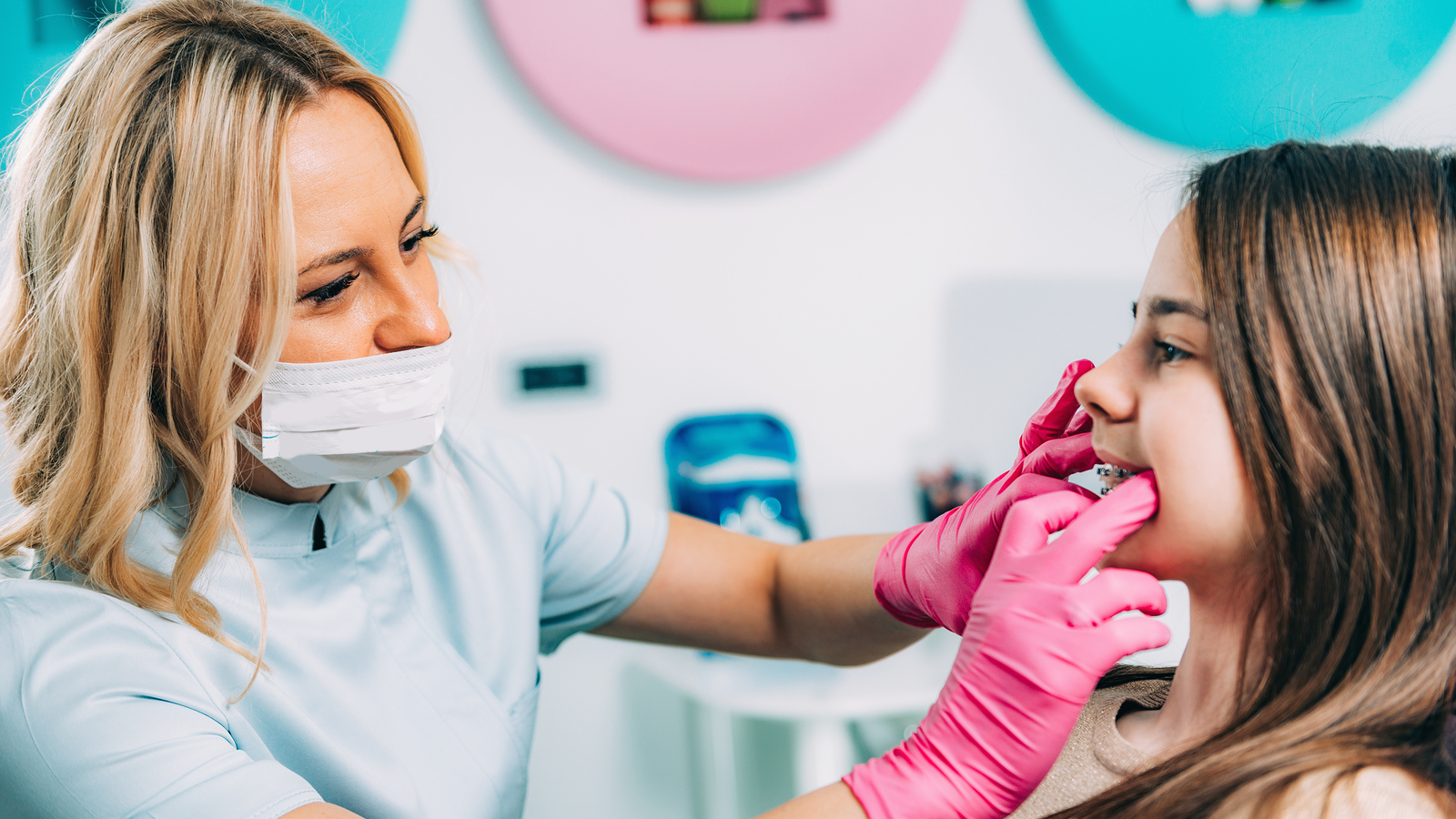
Blog Summary:
- Teeth whitening can cause temporary sensitivity due to peroxide penetrating the enamel and irritating the dentin and pulp, often resulting in quick, sharp pains known as “zingers.”
- Most sensitivity goes away within 24–72 hours, and is more likely with high-peroxide products, prolonged treatments, or whitening that contacts the gums.
- Prevent and manage discomfort with desensitizing toothpaste (potassium nitrate or nano-hydroxyapatite), NSAIDs like ibuprofen, and by avoiding hot/cold foods, brushing gently, and spacing out treatments.
- Choose your whitening products wisely: Lower-peroxide or peroxide-free options, custom trays, and proper use timing can reduce your risk of pain.
- Talk to a dentist before whitening—especially if you have receding gums, sensitive teeth, or previous dental work—to build a personalized, pain-free whitening plan.
Thinking about whitening your teeth or wondering if it’s safe to whiten your kids’ teeth? Worried about the pain associated with doing that? You’re not alone!
Some of the most common questions we get about teeth whitening here at The Super Dentists are “Is teeth whitening safe?” and “Does teeth whitening hurt?”. Truthfully, it’s normal for teeth to hurt a bit after both professional and at-home whitening, and there’s a science behind why it happens!
Thankfully, a little sensitivity doesn’t necessarily mean that it’s unsafe to whiten your teeth or get them professionally whitened. What’s more, there are some easy ways to help combat this sensitivity that we’re going to share with you. So let’s dive right in!
The Science Behind Why Teeth Hurt After Whitening Strips or Professional Whitening
Sensitivity experienced after teeth whitening, whether done at home or by a dentist, is usually caused by peroxide penetrating the enamel of the teeth, reaching the inner layer (or dentin), which houses many small nerve endings. When this happens, the nerves (or pulp) of the affected teeth can become irritated, causing sharp bouts of pain that happen quickly and then fade away. These bouts of pain are often called “zingers”.
Should you be concerned? No, not usually. Zingers are very common. In fact, a study published in the Journal of the American Dental Association revealed that a majority (54%) of participants using a 15% carbamide peroxide whitening gel experienced mild sensitivity.
The most common causes of tooth sensitivity after whitening are:
- Whitening solutions with high concentrations of hydrogen peroxide or carbamide peroxide
- Whitening strips or trays that touch the gums
- Whitening treatments used more frequently or longer than recommended
Thankfully, reducing pain is fairly easy to achieve with painkillers. But what’s the best painkiller for sensitive teeth after whitening? According to research, pain relief analgesics have been shown to combat very little sensitivity after whitening; on the other hand, NSAIDs like Advil or Ibuprofen proved quite effective at providing relief.
How Long Does Teeth Sensitivity Last After Whitening?
For most people, sensitivity and pain after whitening go away after about 24-72 hours.
How to Manage or Prevent Sensitivity
Other than popping a couple of Advil pills, what other solutions exist to help you out when feeling tooth sensitivity after a whitening treatment? Here are some other steps to take:
- Use desensitizing toothpaste with potassium nitrate or nano-hydroxyapatite to both calm the nerves (literally) and rebuild enamel.
- Stay hydrated. Did you know that whitening temporarily dehydrates teeth? This can increase discomfort.
- Avoid extreme temperatures. Skip that hot coffee or frozen margarita.
- Use only a soft-bristle toothbrush. Anything else can cause further sensitivity.
- Take breaks between whitening sessions. Space out treatments so your enamel has time to heal.
- Use oral care products with fluoride or other remineralizing agents like nano-hydroxyapatite.
Did You Know: A 2022 systematic review published in Cureus concluded that applying desensitizing agents like 5% potassium nitrate or 2% sodium fluoride before in-office bleaching was shown to significantly reduce post-operative sensitivity, especially within the first 24 hours!
How to Choose the Right Whitening Products
From strips to blue-light trays; peroxide-based leave-on gels to abrasive-based whitening toothpastes, there are so many whitening products on the market. So it’s essential to pick one that matches your needs, especially if you’re naturally prone to sensitive teeth.
Here’s what to consider when comparing your options:
- Strength of Peroxide: Most whitening solutions use a form of peroxide bleach. For in-office treatments, the concentration can be as high as 25% or even 40%. This can increase the risk of sensitivity. OTC options are usually less effective, but also less strong. But beware: they can still cause sensitivity when not used as directed.
- Application Method: Custom trays designed by a dentist can help you keep whitening solution off your gums, reducing a ton of irritation in the process.
- Product Duration: Do not exceed the recommended usage for any whitening product. Most products are designed to be used for a maximum of 10-14 days. Furthermore, in addition to the use cap, most products recommend taking breaks (often around 6 months or more) before using the same or any other whitening solution. Avoid these at your own risk; doing so will almost certainly cause unnecessary sensitivity and potentially damage to the teeth and enamel.
Are you someone with sensitive teeth who still wants whiter teeth? We get it! Ask us about low-peroxide and peroxide-free whitening solutions, or consider a gentler whitening product like Supermouth toothpaste with Hydroxamin.
Get a Brighter Smile Without the Pain
Hopefully, you now know that experiencing a little sensitivity after having your teeth whitened or using whitening products at home is normal and should usually go away after about 3 days, max. During that period of time, you can avoid trigger foods, temperatures, and take NSAIDs to manage pain. If it doesn’t? Then it’s probably time to schedule a dentist appointment!
If you’re still torn between different whitening options, it may be wise to talk to a dentist about your options – especially if you have receding gums, existing dental work, or naturally sensitive teeth, as these things can substantially increase the level and potentially duration of pain and sensitivity you feel following teeth whitening.











